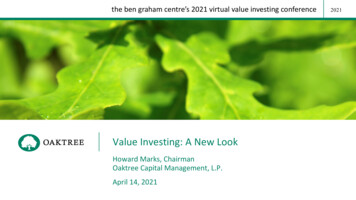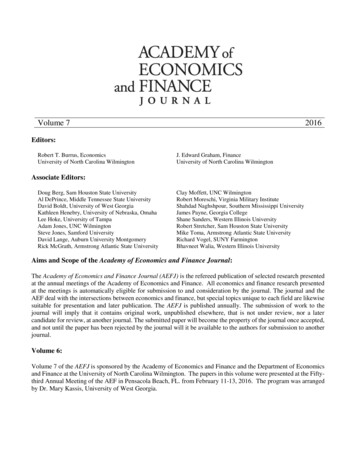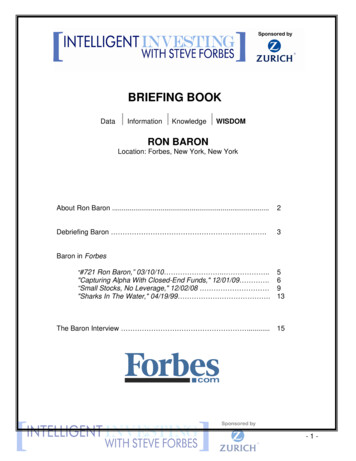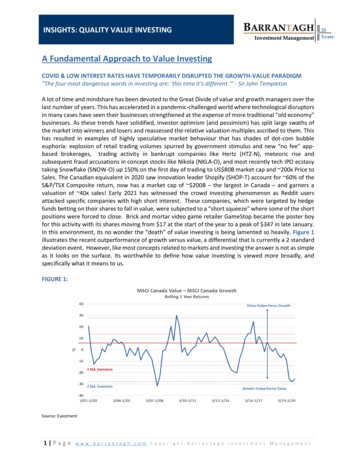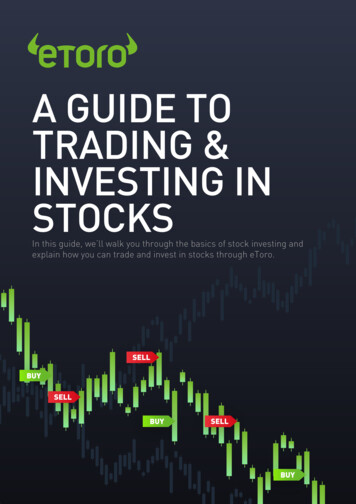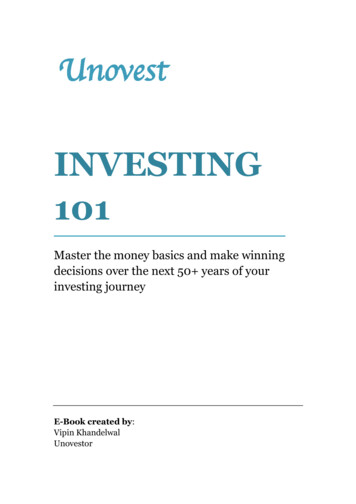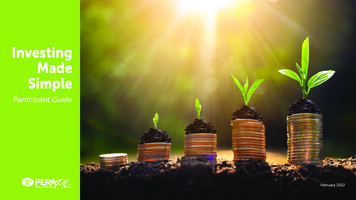
Transcription
www.pwc.com/ghDoing businessand investing inGhana2018
PrefaceDoing Business and Investing in Ghana – 2018 is published byPricewaterhouseCoopers (PwC) Ghana. This publication is intended to provide aquick overview of the business environment in Ghana.We have endeavoured to take reasonable care in compiling this publication,which presents the position of Ghana in respect of the geographic facts,economic performance, economic sectors, investment climate, forms of businessorganisations, business and accounting practices, taxation regimes, etc., as at thedates stated in this publication.Please note that information presented in this publication has been prepared forquick reference and general guidance purposes only, and does not constitute theprovision of professional advice on any particular matters.PwC is a global network of firms, each of which is a separate legal entity. Thefirms that make up the network are committed to working together to provideindustry-focused assurance, tax and advisory services to build public trust and solveimportant problems in society.The Ghana firm, which is a full member of the network of firms of PwC, hasunrestrained access to the global firm’s vast resource base of proprietaryknowledge, methodologies and experience.Our team of multidisciplinary professionals is able to assist you with every matterrelated to this publication and to advise investors as to the best way to do businessin Ghana.Office locations in Ghana and Sierra LeoneAccra officeNo.12 Airport CityTelephone: 233 (0) 302761500Una Home, 3rd FloorFacsimile: 233 (0) 302761544PMB CT 42 CantonmentsEmail: pwc.ghana@gh.pwc.comAccra – GhanaWebsite: www.pwc.com/ghTakoradi officePlot No. 31, GK Ntow StreetTelephone: 233 (0) 312028416/7South Chapel HillFacsimile: 233 (0) 312028410Takoradi – GhanaEmail: pwc.ghana@gh.pwc.comWebsite: www.pwc.com/ghSierra Leone officeNo. 2 MIK DriveTelephone: 233 (0) 78361701Off Barrack Road, Murray Town, FreetownEmail: pwc.ghana@gh.pwc.comSierra LeoneFacsimile: 233 (0) 30 2761544
ContentsGhana at a glance5Republic of Ghana5Tourism and places of interest5Population and people5Education6Economy6The Government Sector8The National Digital Property Addressing System (NDPAS), NationalIdentification Project (NIP) and Interoperable Electronic Platform (IEP)8Government of Ghana Infrastructure for Poverty EradicationProject (IPEP)9Paperless port project9Ghana/Cote d’Ivoire maritime dispute: The InternationalTribunal for the Law of the Sea (ITLOS) win9The economy of Ghana11Investing In Ghana15Setting up a business in Ghana15Tax identification number (TIN)15Types of companies15Statutory/regulatory registration16Operating a foreign account17Repatriation of funds17Immigration18Economic Sectors21Financial services (banks and other financial institutions)21Mining services23The capital market26Information and Communication Technology (ICT)29Agriculture and agribusiness31Upstream oil and gas34Downstream oil and gas35Oil refinery in Ghana36Electricity36Services38Key chambers of commerce and trade associations39Key unions41
The Ghanaian tax regime43Value Added Tax (VAT) and National Health Insurance Levy (NHIL)43Communications service tax (CST)45Customs and excise duties45Special petroleum tax47Income tax47Withholding taxes51Anti-avoidance schemes54Administrative procedures54Tax Identification Number (TIN)54Tax clearance certificates (TCC)55Accounting Issues57Financial reporting standards57Developments in accounting standards57Firm information69Our profileAudit and assurance6969Tax & tax advisory services70Company secretarial services71Advisory services71Our partners and directors73References77Glossary81
Ghana at a glanceRepublic of Ghana Lake BosomtwiCapital city: Accra Aburi Botanical Gardens; and Wli Waterfalls.Location: West AfricaLongitude: 7.9465 degrees NLatitude: 1.0232 degrees WPopulation: 28.9 millionOfficial language: EnglishCurrency: Ghana Cedi (GH )Time zone: GMTClimate: TropicalAverage temperature: 26 C (about 79 F)Independence: 6 March 1957Government: DemocracyGross Domestic Product (GDP): ApproximatelyUS 44 billion (as at September 2017)Inflation rate: 11.8% (December 2017)Tourism and places of interestGhana is a favourite tourist destination inWest Africa. There are many tourist sites andattractions across the country, notably: Kakum National Park Elmina Castle Cape Coast Castle and Fort William Mole National Park Paga Crocodile Pond Nzulezu Stilt VillagePopulation and peopleGhana’s current population is estimatedat about 28.9 million (27.7 million in2016), with females forming 49.1% ofthe total population. According to theUnited Nations Statistics Division, thepopulation density was 119 persons persquare kilometre as of November 2017.The greatest concentration of people is inthe Greater Accra Region. The country’spopulation grew by 2.39% in 2016 andis expected to reach approximately 29million by the beginning of 2018.Ghana has a youthful population, withsome 60% of the population fallingbetween the ages of 15 and 64 years.The age dependency ratio is 66.7%,implying that the dependent section ofthe population is more than half of theworking population.The average life expectancy at birth inGhana is 61 years (59.8 years for malesand 62.3 years for females). This is belowthe average life expectancy of the globalpopulation, which stands at 71 years.Ghana is blessed with a rich diversity ofethnic groups, each with its own uniqueculture and way of life. The officiallanguage and mode of communicationis English, which is taught in all schools.The major ethnic groups in Ghanainclude the Akans (the Akyem, Ashanti,Kwahu, Akuapem, Bono and others),who form about 47.5% of the country’stotal population. Other ethnic groups arethe Ga-Dangme (7.4%), Ewes (13.9%),Mole-Dagbani (16.6%), Guan (3.7%),Gurma (5.7%), Grusi (2.5%),PwC5
Mande (1.1%) and others (1.4%).Ghanaians are known to be veryhospitable people, and this trait spansacross all the ethnics groups. Theyare very religious, as the followingdistribution depicts: Christianityaccounts for 71.2% (Catholic – 13.1%,Protestant – 18.4%, Pentecostal/Charismatic – 28.3%, others – 11.4%),Islamic worship for 17.6%, traditionalworship for 5.2%, other religions for0.8% and no religion for 5.2%.EducationThe school-going age in Ghana is from3-21 years old. The educational structureof Ghana comprises: Pre-school (ages 3-5); Basic/Primary school (equivalent toelementary school) (ages 6-11); Junior high school (equivalent tomiddle school) (ages 12-14); Senior high school (equivalent to highschool) (ages 15-17); and Tertiary education/Institutionequivalent to college/university (ages18-21).In Ghana, the tertiary educationalinstitutions comprise the polytechnicsand universities, colleges of educationinstitutions and nursing trainingcolleges.The Ministry of Education has oversightresponsibility over educational issuesin the country. The Ministry overseesvarious councils and bodies that areresponsible for co-ordinating andimplementing national policies oneducation. These bodies include:6Doing Business and Investing in GhanaGhana Education Service It is responsible for pre-tertiaryeducation.National Council for TertiaryEducation This is the Council that oversees theadministration of tertiary institutionsof education in Ghana. It serves asthe supervisory and regulatory bodythat advises government throughthe Minister of Education on policiesrelating to tertiary education.National Board for Professional andTechnician Examinations It has oversight responsibility overprofessional and technical institutionsthat are not universities.EconomyThe services sector is the largestcontributor to Ghana’s GDP (62% as ofthe end of the second quarter of 2017).The industrial sector is the next largestsector of the economy (26.5% as at theend of the second quarter of 2017),followed by the agricultural sector with a11.5% contribution to GDP at the end ofthe 2017 second quarter.With about 778, 044 metric tonnes ofcocoa beans having been produced inthe 2015/2016 crop year, Ghana is thesecond-largest producer of cocoa in theworld after Côte d’Ivoire.Ghana is currently a net importer ofpetroleum products. However, expectedproduction of oil and gas from theTweneboa, Enyenera, and Ntomme(TEN) and Sankofa oilfields will increaseoutput in 2018 and improve the balanceof trade position.
Gold production was expected to increasein 2018 after a 45% increase in outputfrom 2015 to 2016. Total gold outputwas 4.1 million ounces, attributablemainly to artisanal miners (1.5 millionounces in 2016, from 267 662 ounces in2015). The issue of illegal gold miningaffected gold revenue earned by thecountry in 2016. The Minister of Landsand Natural Resources indicated thatapproximately 2.3 billion worth ofgold was lost through illegal mining. Assuch, the government has rolled out theMultilateral Mining Integrated Project tocurb this practice.Ratings agency Fitch revised the outlookon Ghana’s credit rating from negativeto stable and affirmed their B creditrating, mainly due to progress madein stabilising the economy with anexpected improvement of GDP growth,declining inflation, a stable currency andincreased foreign exchange reserves. Inaddition, Fitch is of the opinion that thecurrent government will make progressin reducing the budget deficit after thefiscal slippage experienced prior to theelections in November 2016.PwC7
The government sectorGhana practises a democratic systemof governance. Parliamentary andpresidential election was held every fouryears in accordance with the provisionsof the 1992 Constitution. The mostrecent elections were in 2016, with thecountry experiencing a smooth transitionin government.The Constitution provides a clearlydefined separation of powers among thelegislative, executive and judicial arms ofgovernment.There are ten administrative regions inGhana with 254 metropolitan, municipaland district assemblies (MMDAs). Ghanapractises a system of decentralisationwhere the various regions and MMDAsare allowed some degree of autonomy indecision-making.Ghana also maintains various structuresof traditional rulership recognised underthe Constitution. The role of traditionalleaders is to mobilise people to pursuedevelopmental goals at the local andcommunity levels. Traditional chiefs inGhana have been organised into regionaland national houses of chiefs.Ghana’s legal system is based on the1992 Constitution, with statutes beingenacted by Parliament; and rules,orders and regulations enacted throughdelegated legislation, common lawand customary (traditional) law. Thehierarchy of the court structure in Ghanais as follows: the Supreme Court (i.e. the highestcourt); the Court of Appeal, and the HighCourts (these two courts andthe Supreme Court are togetherreferred to as the superior courts ofjudicature); and The Circuit and District courts, whichform the lower courts.8Doing Business and Investing in GhanaThe office of the Attorney-General ofGhana has powers to prosecute matterson behalf of the State and is required tobe joined in all legal actions against theState.The Office of the Special Prosecutor wasrecently set up as a specialised agency toinvestigate specific cases of corruptioninvolving public officers, and politicallyexposed persons in the performance oftheir functions, as well as individualsin the private sector implicated inthe commission of corruption and toprosecute these offences on the authorityof the Attorney-General.The National Digital PropertyAddressing System (NDPAS),National Identification Project(NIP) and InteroperableElectronic Platform (IEP)The government aims to formalise thecountry’s economy by establishing anational database for easy identificationand increased access to information onits citizens, locations and businesses. Itlaunched the NDPAS and NIP in 2017to enhance business activities in Ghanathrough the creation of a secure personalidentification system for citizens andestablishing proper national address andlocation systems, respectively. Theseprojects are also expected to improvesecurity and facilitate the deployment ofemergency services.An IEP was launched in May 2018 for thefinancial sector with the aim of reducingthe risk of doing business in that sector.Also known as the bank interoperabilitysystem, it will interface mobile moneytransactions with the banking systemto monitor and facilitate electronictransactions within the country. Once ithas been implemented, it will also worktogether with the NIP to create a robustcredit database which will reduce thecost involved in obtaining financing fromfinancial institutions.
As the country continues to leverage ontechnology in the business space, manygovernment institutions – includingthe Registrar General’s Department(RGD), the Passport Office and theGhana Revenue Authority (GRA) –are deploying online systems to servetheir customers. The registration ofbusinesses, applications for passportsand filing of some taxes in specific GRAoffices can now be conducted online.These innovations have not come withoutchallenges, but the government remainspositive that all the online functionalitieswill be fully functional by the end of2018.Government of GhanaInfrastructure for PovertyEradication Project (IPEP)In an attempt to eradicate poverty,the government has instituted severalinitiatives under the IPEP to beimplemented by three developmentauthorities: the Northern DevelopmentAuthority, the Middle-Belt DevelopmentAuthority and the Coastal DevelopmentAuthority. Under the IPEP, US 1 millionwill be disbursed to each of the 275constituencies across Ghana to undertakedevelopment projects at a decentralisedlevel. The projects under considerationinclude the government’s flagshipprojects: one-district-one-factory; onevillage-one-dam and one-district-onewarehouse. The projects are expected tostimulate economic activity in differentparts of the country and drive thegovernment’s rural industrialisationagenda.Paperless port projectThe government implemented apaperless port operations systemwhich is aimed at increasing efficiencyat the ports by reducing the numberof hours spent in clearing goods andincreasing tax revenue. The aim is touse increased technology and improvedinfrastructure and human resourcesto achieve a reduced average numberof hours that shipping vessels spend atthe ports, to four to eight hours fromthe recorded average of one hundredand three hours in 2016. Increasedport efficiency is expected to increaserevenue mobilisation and reduce thestress associated with clearing goodswhile opening up the ports to morebusiness, since 80% of Ghana’s tradevolumes are currently done through seatransportation.Ghana/Cote d’Ivoire maritimedispute: International Tribunalfor the Law of the Sea (ITLOS)winIn September 2017, Ghana won a threeyear-long maritime border dispute caseagainst Cote d’Ivoire after a favourableruling by the Special Chamber of theInternational Tribunal for the Law ofthe Sea (ITLOS). ITLOS’s first rulingin 2015 placed a moratorium on newprojects within the TEN oil fields whichprevented Tullow Oil from drillingadditional oil wells in the area. Followingthe ruling, Ghana’s oil production isexpected to be boosted as it will be ableto keep its oil concessions and furtherdevelop the oil fields.PwC9
10Doing Business and Investing in Ghana
The economy of Ghana The Ghanaian economy significantlyoutperformed the global economy andall major sub-groupings in 2017, andthe same is forecasted for 2018. WhileGhana’s GDP growth rate is expectedto decline slightly to 6.8% in 2018, it isstill expected to be higher than that ofthe world economy. Ghana’s economic growth ratewas higher than that of the globaleconomy and most of sub-SaharanAfrica in 2017. The country hasbeen an attractive investmentdestination as a result of the relativepolitical stability and improvedmacroeconomic conditions over thelast two decades. Government is alsoputting in place additional measuresto enhance Ghana’s attractiveness asan investment destination, includinga review of the Ghana InvestmentPromotion Centre (GIPC) Act andefforts to make Ghana the businesshub of the West African sub-region.These measures will increase theattractiveness of the country to foreigninvestors and enhance Government’sindustrialisation agenda. The World Economic Outlook (WEO)report for October 2017 estimates thatthe average inflation rate in advancedeconomies will be 1.7% in 2018, thesame as in 2017. For emerging marketsand developing economies (EMDEs),average inflation is expected to be4.2% in 2017, with a marginal increaseto 4.4% in 2018.Global Inflation %0.3%0.0%20152016World Economy20172018Advanced EconomiesPwC11
While global inflation is expected toincrease moderately, developments inadvanced economies present risks tothe projected level of inflation. The USFederal Reserve increased rates twicein 2017 and the UK Treasury interesthas followed suit by increasing ratesfor the first time in almost a decade.These are likely to make governmentsecurities in advanced economies moreattractive, leading to a potential increasein investment in these securities. Sucha development will strengthen hardcurrencies such as the US Dollar. Astronger US Dollar can put exchangedriven inflationary pressure on theGhana Cedi.In 2017, there was no significant changein the structure of the economy. Theservices sector continues to be the largestcontributor to GDP. With the exceptionof the industry sector which expanded,the services and agriculture sectorscontracted marginally. The 2018 BudgetStatement estimates that significantgrowth was achieved in the economy in2017, with real GDP growth estimatedat 7.9% at the end of 2017, higher thanthe target growth of 6.3%. This higherthan-budgeted growth was driven byan increase in oil production as a resultof the deferral of the Jubilee floatingproduction storage and offloading(FPSO) turret remediation projectedfrom the third quarter of 2017 to 2018and the commencement of production inthe Sankofa-Gye Nyame oilfield.Sectoral Structure of the 8%201228.0%22.9%49.1%Service12Doing Business and Investing in GhanaAgricultureIndustry
20%Growth per sector 2013 – 2014AgricultureThe structure of the Ghanaian economyis not expected to change significantly inthe short to medium terms. The currentstructure has the characteristics of amature or stable economy, where growthin the industry and services sectorsdrives overall economic growth. Thereare a number of agriculture and industryrelated policy initiatives which areexpected to drive growth. The servicessector is also expected to continuegrowing, driven by the information andcommunication subsector. As indicatedin the 2018 Budget Statement, thereare plans to invest heavily in agriculturewith a focus on mechanisation and alsoto ensure rapid industrialisation of 0.025.020.015.010.05.00.0-5.02017ServicesGDP (GH bn)2018, allowing for increased productionin 2017 and a lower forecast productionin 2018 than originally projected. Themanufacturing subsector is expected toslowly recover from the severe hit it tookat the height of the power crisis, with a2017 provisional outturn of 2.7%.Growth in the industry sector for 2017was estimated at 17.7%. This was largelydriven by the mining and quarryingsubsector, of which upstream petroleumconstitutes a significant share. Upstreampetroleum had a provisional outturn of69.2% in 2017, a sharp reversal from thenegative 16.9% recorded in 2016. Thisfigure is higher than previously targetedand is principally due to the deferral ofthe FPSO turret remediation project toPwC13
14Doing Business and Investing in Ghana
Investing in GhanaSetting up a business in GhanaBusiness can be conducted undereither a limited liability company (localcompany) incorporated under the lawsof the Republic of Ghana or an externalcompany (branch). The regulatorresponsible for this is the RGD.Tax identification number (TIN)Prior to the registration of an entitythe directors and the secretary ofincorporated entities or the localmanagers of branches are required toregister for and obtain a TIN. Registered office and principal place ofbusiness and postal addresses; Authorised number of shares; Stated capital; Issued shares; Name and address of subscribers/shareholders; and Name of company secretary.Stamp dutyA 0.5% stamp duty is payable on thestated capital of the company.FeesTypes of companiesSubsidiary (local company)This is a company limited by sharesincorporated under the GhanaCompanies Act, 1963 (Act 179). Asubsidiary can either be wholly or partlyowned by a Ghanaian or a non-Ghanaian.Registration requirementsof a subsidiaryThe registration of a local companyinvolves the filing of the requiredforms with the RGD in order to obtaincertificates of incorporation andcommencement of business, profile(forms 3 and 4) and a certified true copyof the company’s regulations.The documentation/informationrequired for the registration of asubsidiary includes the following: Name of company; Nature of business of the company; First directors (a minimum of twois required), of whom one must bepresent in Ghana at all times; Number of shares with which thecompany should be registered (sharesof no par value);In addition to the stamp duty, asubsidiary must pay a registration fee ofapproximately US 75 (GHS330).External companyAn external company (also known asa branch) is a body corporate formedoutside the Republic of Ghana thathas an established place of business inGhana.The information and documents requiredfor the registration of an externalcompany are as follows: Name of company (name of headoffice entity); Nature of business; Name and details of local manager; Authorised capital (for head office); Issued capital (for head office); Address of principal place of businessin Ghana; Address of registered office in countryof incorporation; Name and address of process agent; Memorandum and articles ofassociation of head office, dulynotarised by a notary public in thecountry of registration; Name and address of auditor;PwC15
A power of attorney executed in favourof the local manager, which must benotarised as well; and Certificate of incorporation of thehead office, duly notarised in thecountry of registration.Statutory/regulatoryregistrationApart from incorporating or registeringentities with the RGD, entities arerequired to be registered with otherregulatory bodies (as discussed below) aswell, depending on the industry that theentity will be operating in.Ghana Investment PromotionCentre (GIPC)Under the GIPC Act of 2013 (Act 865)(GIPC Act), all companies in which thereis foreign participation are required toregister with the GIPC.The following are the minimum capitalrequirements under the GIPC Act:a. A joint venture with GhanaianparticipationIn a joint venture with at least 10%Ghanaian participation, the foreignpartner is required to contributenot less than US 200,000 (in eithercash or capital goods) relevant to theinvestment.b. A wholly owned foreign entityAn entity wholly owned by a nonGhanaian requires a minimumamount of foreign equity capital ofUS 500,000 in either cash or capitalgoods relevant to the investment.16Doing Business and Investing in Ghanac. Trading entityA trading entity that is either whollyor partly owned by a non-Ghanaianrequires a minimum equity capital ofUS 1,000,000 in either cash or capitalgoods relevant to the investment.Ghana Free Zones Board (GFZB)Companies operating in industriesother than mining, petroleum or timbercan obtain a license from the GFZB tooperate as a free zone entity. To qualifyfor this, the entity needs to export atleast 70% of its goods or services. GFZBregistration enables the company toenjoy a tax holiday for a period of tenyears; thereafter, it will be required topay corporate tax of 25% on local salesand 15% with respect to exports.Minerals Commission (MC)All mining and mine support servicecompanies are required to register withthe MC in order to operate in the miningsector. The registration entitles them tocertain incentives, such as support inthe form of the granting of an expatriateimmigration quota, exemption fromimport duties and authorisation toinvoice and receive and make paymentsin foreign currency subject to approvalfrom the Bank of Ghana.Petroleum Commission (PC)All entities in the upstream oil andgas sector, whether contractors,subcontractors or sub-subcontractors, arerequired to register with the PC and paythe required registration fees.To operate in the upstream oil andgas sector as a foreign investor, one isrequired to establish a joint venture (JV)with an indigenous Ghanaian company(IGC) that has at least a 5% or 10%ownership in the JV in the case of acontractor or subcontractor respectively.
National Communication Authority(NCA)Registration with the NCA will berequired if businesses will be importingtelecommunications equipment,including servers, cellular phones, faxmachines, cordless phones and radioequipment.Social Security and NationalInsurance Trust (SSNIT)The threshold for transfers abroad fromthis account is US 10,000 without anyinitial supporting documents. Thereafter,transfers must be accompanied bysupporting documents.Transfers from FEAs to foreign currencyaccounts (FCAs) are not allowed.Transfers from FEAs to Cedi accounts areallowed.Every employer is required by law toregister with the SSNIT and pay Tier 1pension contributions in respect of itsemployees.Foreign currency account (FCA)They are also required to register with aprivate pension fund manager for Tier 2pension contributions on behalf of theiremployees.FCAs should be credited with unrequitedtransfers such as transfers from abroadfor investment or embassy transfers.Ghana Revenue Authority (GRA)Entities carrying on business in Ghanaare required to register with the GRA fortax purposes.Other regulatory bodiesCompanies operating in certain specificindustries, such as banking, insurance,etc., need to obtain licenses from theirrelevant regulatory bodies. For example,banks need to obtain an operating licensefrom the BoG, and insurance companiesneed to obtain an operating license fromthe National Insurance Commission(NIC).Operating a foreign account inGhanaForeign exchange account (FEA)Both residents and non-residents arepermitted to maintain an FEA.Both residents and non-residents mayopen FCAs with any authorised dealerbank in Ghana.Transfers from FCAs to FEAs are allowed.Transfers from FCAs to Cedi accounts areallowed.FCAs are free from restrictions, andtransfers to and from these accountsmay be made freely by authorised dealerbanks in convertible currencies.Repatriation of fundsFunds in respect of branch profits,repayment of loans, dividends andmanagement/technical fees are allowedto be repatriated in foreign currencyafter the appropriate withholding taxeshave been paid and the respectivetax clearance certificates obtained asevidence of payment.The transferring entity must alsosupport these transfers with supportingdocumentation (e.g. audited accounts,the loan agreement, technology transferagreement registration certificates etc.).FEAs should be credited with foreignexchange generated from activities inGhana, such as proceeds from exports ofgoods and services.PwC17
ImmigrationGhana Immigration Services (GIS) is theinstitution responsible for the issuanceof the various types of permits, includingwork and residence permits, visitor’spermits and emergency entry visas,among others.There are, however, other institutionsthat also issue work permits aside fromthe GIS which are discussed below.Work permitsWork permits can be obtained fromthe GIPC in the form of an automaticexpatriate quota (AEQ) or from theMinistry of Interior (MOI) in the form ofan immigrant quota or from the GIS.Obtaining an AEQ from the GIPCThe AEQ is an automatic work permitgranted to expatriates by the GIPC basedon the foreign equity capital investmentmade by a company. To benefit fromthis, the company must be registeredwith the GIPC. The foreign equity capitalinvestment bands for the granting ofAEQs are as follows:Paid-up capital(US )No. ofexpatriate(s)Not less than 50 000and not more than250 000Not less than 250000 and not morethan 500 000Not less than 500000 and not morethan 700 000More than 700 0001234Short-term or temporary quotafrom the GIPCAside from the AEQ, an entity cannegotiate with the GIPC for additionalquotas, known as short-term ortemporary quotas. These are not grantedautomatically but are issued on adiscretional basis for a maximum periodof five years or less.Unlike with the AEQ, an entity whichrequires this quota from the GIPC willhave to provide a justification to theGIPC as to why they should be given theadditional quota.Obtaining immigrant quotas from theMinistry of Interior (MOI)The MOI also issues immigrant quotas(IQs), which are equivalent to workpermits. Once an IQ has been issuedto an expatriate, the applicant canapply to the GIS for a residence permitwithout having to apply for a workpermit.Expatriates making use of the IQ maybe replaced with another expatriateonce they leave the employment of theapplying company. It is issued for amaximum period of three years.Obtaining work permits from the GISCompanies that do not use the quotamay apply to the GIS for a workpermit. The GIS usually issues workpermits for a period of one year.However, it is possible to obtain awork permit for a period of two yearsas well.Entities operating in the mining sectorare required to obtain letter(s) ofrecommendation from the MC prior tomaking application to the GIS for workpermits.In the case of upstream petroleumopera
Doing Business and Investing in Ghana - 2018 is published by PricewaterhouseCoopers (PwC) Ghana. This publication is intended to provide a quick overview of the business environment in Ghana. We have endeavoured to take reasonable care in compiling this publication, which presents the position of Ghana in respect of the geographic facts,


